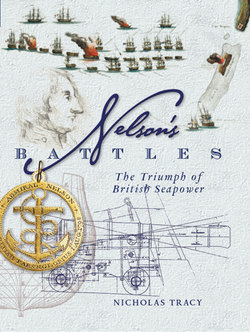Читать книгу Nelson's Battles - Nicholas Tracy - Страница 7
На сайте Литреса книга снята с продажи.
ОглавлениеPreface to Revised Edition
AT THIS CRITICAL time in the life of the planet, there is an ironic twist to the story of the battle of Trafalgar. The engagement between the combined fleets of France and Spain, and that of Britain, in which thousands of lives were lost, and many people more were maimed, was fought as the surges of a mighty storm were driving in on the coast, with the anticipation of the great winds that were to be far more terrible to Vice Admiral Collingwood than was the battle itself. Two hundred years later, these nations are linked in the European Union, and all are turning to meet the peril caused by global warming.
This fact does not diminish the importance of Nelson’s victories. The naval battles won by the officers and men of the Royal Navy, led and inspired by Nelson’s commitment and courage, were fundamental to the outcome of the wars triggered by the French Revolution, and sustained by Napoleonic ambition. That victory, and the part played by the Royal Navy in the two world wars of the twentieth century that ensured the world would not be dominated by militarism and Nazi extremism, made the present era of democracy in Europe possible. There is an analogy between the tactical problems of fleet commanders, who must find effective ways of dealing with technical and human issues if they are to create a war machine, and the political sensitivities needed of statesmen if they are to address the climactic threats to life on earth. And in particular, the conflict that exists between effective action and individual human liberty, and the threat that diminishing economic resources lead to unparalleled competition between nations and within nations, is all too similar to the conflicts triggered by the French Revolution.
This revised edition has benefited from the work that has been done by dozens of scholars on the subject of Nelson, his battles, and the surrounding military history of the period. Ten years ago it might have been thought that everything that could be known about the subject had already been squeezed from the documents, but much has happened in those years, perhaps largely because 2005 was the 200th anniversary of the battle of Trafalgar. That generated a tremendous amount of interest in the subject, an interest stoked effectively by Peter Warwick and the 1805 Club. It would be invidious to single out one or two of the authors of the new biographies of Lord Nelson, but with seventy-one new Nelson titles since 1995 a revision of my Nelson’s Battles was in order. I am particularly grateful to Richard Harding for letting me read the papers from the 2005 Trafalgar conference which are to be published this year as A Great and Glorious Victory: New Perspectives on the Battle of Trafalgar, also by Seaforth.
Nicholas Tracy
Fredericton, New Brunswick, 2008
